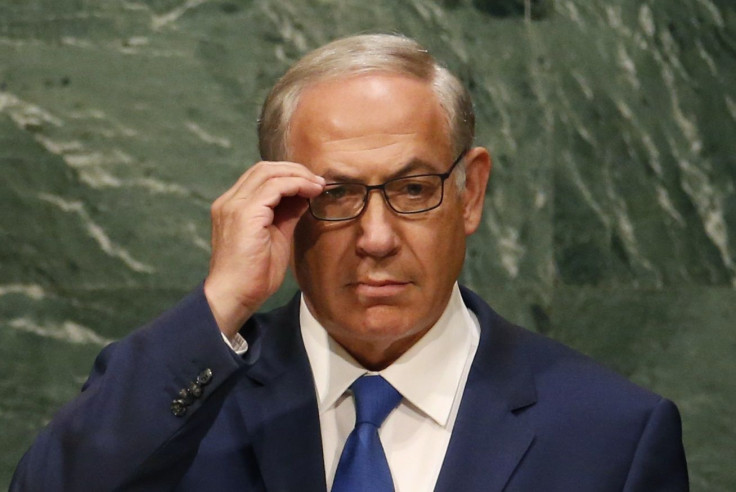Netanyahu Dramatic Pause UN Speech: Israel Prime Minister Rails Against Iran Deal, Calls On Palestine To Negotiate Peace [VIDEO]

Israel's Prime Minister Benjamin Netanyahu used his platform at the United Nations General Assembly Thursday to rail against the Iran nuclear deal before issuing a harsh rebuke in response to Palestinian leader Mahmoud Abbas' announcement Wednesday that his government was no longer bound by agreements with Israel. The Iran deal posed a grave danger to world peace, he said, before accusing the United Nations of exhibiting "utter silence, deafening silence" in the face of threats to Israel over the decades.
"Unleashed and unmuzzled, Iran will go on the prowl, devouring more and more prey," Netanyahu said at the podium in New York. "In the wake of the nuclear deal, Iran is spending billions of dollars on weapons and satellites. Do you think Iran is doing that to advance peace?"
Netanyahu called on the world to stand up to Iran, and said he refused to be silent, a point he underscored with his own dramatic, elongated, wordless pause before continuing. "It’s not easy to oppose something that is embraced by the greatest powers in the world," Netanyahu said. "Believe me, it would be far easier to remain silent. But throughout our history the Jewish people have learned the heavy price of silence."
Netanyahu's speech came just a day after Abbas told the General Assembly Wednesday that his government would no longer abide by international agreements with Israel, specifically the 1993 Oslo Accords, as Israel continued policies the Palestinian leader considered counterproductive and illegal, including the expansion of settlements in the West Bank. Abbas called on the international community to recognize Palestinian statehood and stand up for Palestinian rights.
Netanyahu said Thursday that Israel remains committed to peace with the Palestinians, and he would be willing resume peace negotiations with the Palestinian Authority without preconditions, criticizing Abbas' announcement one day earlier, which the Israel prime minister called "deceitful." Netanyahu's office said Abbas' announcement "encourages incitement and destruction in the Middle East," Agence France-Presse reported.
"How can Israel make peace with a Palestinian partner who refuses to even sit at the negotiation table?" Netanyahu asked Thursday.
Abbas’ announcement came as Palestinians have grown increasingly fed up with the Israeli prime minister, but has received widening support from the international community. The Palestinian flag was raised at the U.N. for the first time Wednesday, and in 2012, the General Assembly voted to accept Palestine as a nonmember nation state.
Netanyahu focused on the threat posed by Iran, however, as he has done repeatedly in his annual U.N. addresses. He famously held a cartoon-looking image of a bomb at the podium in 2012, in hopes of expressing urgency to address Iran's nuclear program. He has sought to portray Iran as a destabilizing, dangerous threat to Israel and the world.
"I’ve said that if Iran wants to be treated like a normal country, let it act like a normal country," Netanyahu said Thursday. "But this deal will treat Iran like a normal country even if it remains a country that sponsors terrorism worldwide and chants, 'Death to Israel, Death to America.'"
Netanyahu also sought to link Iran's leaders to a long history of hostile nations wanting to destroy world Jewry. "Here’s my message to Iran: Your plan to destroy Israel will fail."
Iran nuclear deal, reached in July by the U.S., Iran and five other world powers, is expected to see the lifting of crippling international sanctions against Iran in exchange for a commitment to ending its nuclear program. Critics of the deal, many of them citing Israeli security, have insisted Iran cannot be trusted to keep to the terms of an agreement.
Though the Iran nuclear deal has won wide international support, Netanyahu has come out a strong international opponent.
Netanyahu is set to meet with U.S. President Barack Obama in November in Washington. Though tensions between the two are considered high over the Iran deal, Netanyahu sought to assert good relations between the two countries Thursday, saying disagreements were "within the family."
"The alliance between Israel and the United States is unshakable," he said.
© Copyright IBTimes 2024. All rights reserved.






















